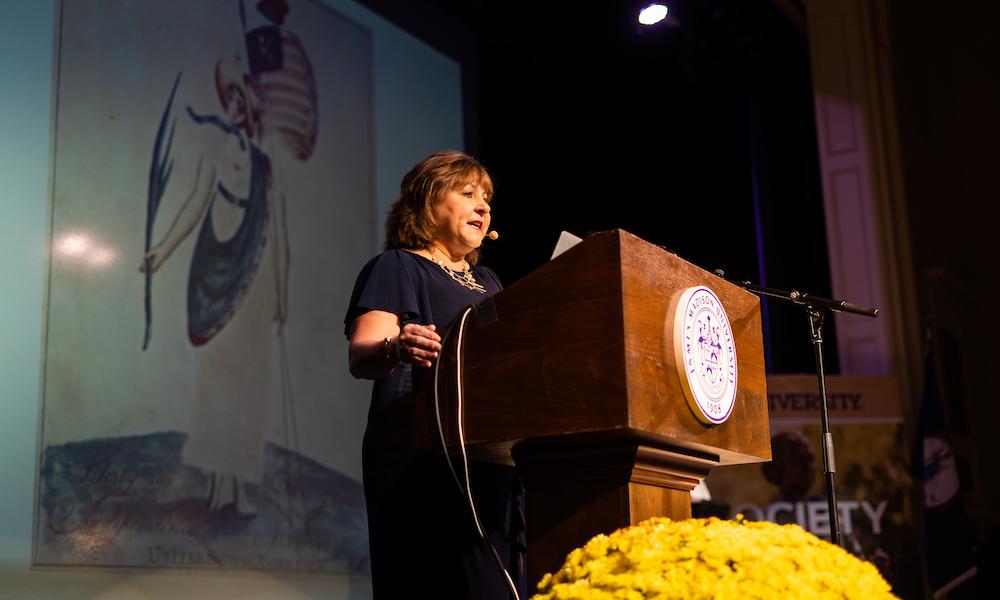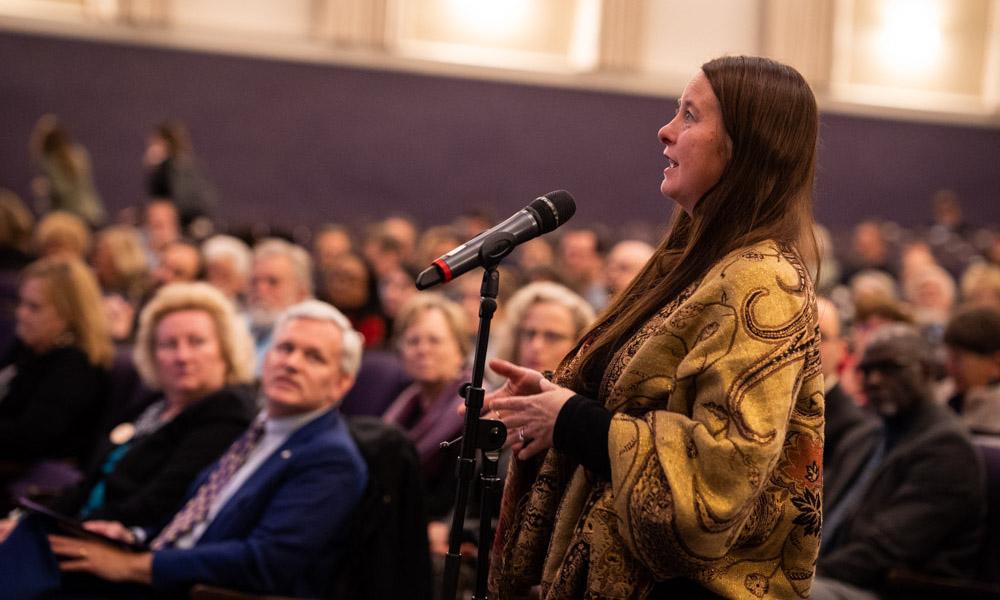A right and a privilege
Scholar discusses the road to women’s suffrage
News
SUMMARY: Rosemarie Zagarri, an early American scholar and professor of history at George Mason University, presented “Petticoat Politicians: How Women Won and Lost the Vote in Early America” on Nov. 4 in Wilson Hall as part of the Madison Vision Series.
By Jim Heffernan (’96, ’17M)
Next year marks the centennial of women gaining the right to vote in America. But in the more than 100 years prior to the 19th Amendment to the Constitution, women participated in the political process and some even did so at the ballot box.
Rosemarie Zagarri, an early American scholar and professor of history at George Mason University, presented “Petticoat Politicians: How Women Won and Lost the Vote in Early America” on Nov. 4 in Wilson Hall. The Madison Vision Series lecture was held in conjunction with the JMU history department’s “Democracy in Peril?” forum.
In Colonial America, women were “political nonentities,” Zagarri said. They couldn’t vote or hold public office. Married women were seen as subordinate to their husbands and could not own property, make wills or sit on juries. “It was an exclusively male realm that women did not dare transgress into,” she said.
But that began to change during the American Revolution, which Zagarri labeled “a contest for the hearts and minds” of ordinary people. Leaders of the resistance movement realized that if they wanted to be successful in exerting economic pressure on Great Britain, they needed the support of women, she said. Newspapers, magazines and pamphlets appealed to women as consumers, urging them not to buy British goods such as china, cloth, hats, buttons and tea.
“This is the beginning of a recognition that women have a political role to play,” Zagarri said. “And what’s fascinating is that women responded.”
They formed associations such as the Daughters of Liberty, met in public and in private to debate the issues of the day, and participated in protests against merchants who violated the boycott. “They began to think of themselves as political agents,” Zagarri said.
Some women, such as Mercy Otis Warren, Phillis Wheatley and Esther de Berdt, lent their voices to the revolution as published poets and authors. Judith Sargent Murray of Massachusetts published an essay, “On the Equality of the Sexes,” which argued that women have the same intellectual capacity as men.
|
"History doesn’t always move toward the inclusion of groups. Sometimes rights can be lost as well as gained. We must defend the right to vote, especially for groups who may be vulnerable to disenfranchisement." — Rosemarie Zagarri |
Following the American Revolution, there was an emphasis on education as vital to the future of the republic, Zagarri said, as well as a growing consciousness of women’s rights.
Voting rights during the period varied by state, she said, but the prevailing notion was that suffrage was a privilege reserved for those who owned property—a requirement that overwhelmingly favored white men. In some states, unmarried women and widows were allowed to vote if others vouched for their status as property owners, but their numbers were largely insignificant.
New Jersey was the first state to experiment with universal suffrage, Zagarri said. Beginning in 1790, married and unmarried women in the Garden State, as well as free blacks, voted on the same terms as men. These groups largely supported Federalist candidates, she said.
Elections at the time were bawdy affairs, sometimes held in taverns, Zagarri said. Individual votes were openly challenged, and riots were not uncommon. Women who participated in the process were seen as “unwomanly.” Privately, some men began to worry that women might be emboldened to one day run for public office, she said.
The New Jersey experiment came to an end in 1807 after an especially contentious election fraught with corruption, Zagarri said. Women and blacks were unfairly blamed for inflating the vote totals. Ultimately, the state legislature voted to disenfranchise these groups. Over the next four decades, the process of limiting voting rights to free white males was repeated as new states joined the union and older states rewrote their constitutions, she said.
 |
| A member of the audience asks Zagarri a question following her lecture. |
After the Civil War, women in some western states were allowed to vote, Zagarri said, but the vast majority of women in the United States were denied that right until the 19th Amendment was ratified in August 1920.
“So what can we learn from this sad tale?” Zagarri asked. “History doesn’t always move toward the inclusion of groups. Sometimes rights can be lost as well as gained. We must defend the right to vote, especially for groups who may be vulnerable to disenfranchisement.”
And on the eve of statewide elections in Virginia, Zagarri urged those in attendance to exercise their right to vote.
“It’s a duty as well as a right,” she said. “It’s our way of expressing our responsibilities to our fellow citizens and to the state.”
In the spirit of engagement, Zagarri took questions from students and community members following the lecture.
“As we seek to become that ‘more perfect union,’” President Jonathan R. Alger concluded, “it’s incumbent on all of us ... to recognize the contributions of all Americans.”
